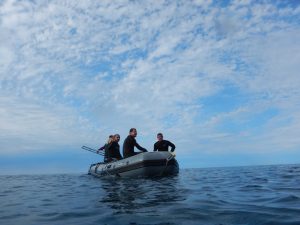I am writing this post from La Paz, Baja California Sur, Mexico, where I will be doing fieldwork for the next 2 months. Stay tuned for more posts related to my research! However, since I’ve just arrived in the field and preparing is fresh in my mind, I want to kick off my fieldwork-themed posts with a list of 10 things not to forget when you are preparing to go into the field. This list is (clearly) not comprehensive – but these are things that are easy to forget, and you may find this list helpful as you are preparing for fieldwork in a foreign country. I’ve included photos from my past week in the field.
#10: Set your email auto-response.
If you will be somewhere with limited or no internet access, remember to set an auto-reply on your email for the dates you will be gone. Here is a template for your convenience: Dear colleague, Thank you for your email. However, I will be in the field until ____ with limited/no internet access. I will respond to your email as quickly as possible; thank you for your patience. Best regards, ______.
#9: Look up the local currency exchange rate.
Do this BEFORE you go so you know how much money to withdraw from the ATM at the airport. You might think that the airport will have exchange rates posted, but if you are flying into a small airport, this might not be the case. Do yourself a favor and look up the exchange rate (and know how much money you will want/need).
#8: Call your credit and debit card companies.
Call the company of whatever credit/debit cards you will be intending to use while abroad and tell them the countries you will be visiting and the dates you will be there. The number to call can be found on the back of the card. If you’re lucky, your card company will have moved to a nifty online travel notice system, so you don’t have to dance around the call menus. Even if you think you won’t be needing or using a credit or debit card while abroad, do this. I always do one credit card and one debit card, in case of emergencies. Pack them in different bags.
#7: Vaccines and prescriptions.
Schedule an appointment with your doctor to get vaccinated. Before going to the doctor, check the CDC website for the countries you will be visiting (http://wwwnc.cdc.gov/travel) to see what the CDC recommends for the region you will be going to. Also, if you have any prescription medications, make sure you have enough prescription refills to pick up enough medication for the entire time you will be abroad. You may need to call your insurance company and tell them you will be traveling so that they will cover medications for the entire time, although some pharmacies will do this for you.
#6: Health care abroad.
Take the time to figure out your health care deal. Will your health care cover any medical problems you have while abroad? Make sure you know EXACTLY what to do in case of an emergency: who you will call; who will pay; how to get reimbursed; etc. Consider calling your health care provider to clarify these details.
#5: Phone plan abroad.
Figure out your phone plan while you are abroad. If you decide not to invest in a foreign phone plan, make sure you know how much each minute or message or MB of data will cost you. However, some phone companies offer attractive deals for going abroad – call and find out.
#4: Tell your friends and family where you will be.
Self-explanatory. Make sure you do this, particularly with friends/family that you talk with less often who might not know you are going abroad, and who might worry about you if your phone is turned off for a long period of time.
#3: Put essential items in your carry-on.
You already know this if you travel much, but never count on your baggage making it to your final destination on time. If you have any critical items, especially ones you will be using in the first week after arriving, especially things you can’t buy where you are going, make sure you have these packed in your carry-on.
#2: Leave rent checks.
Make sure you leave rent checks with your roommate or landlord before you go, and that you have made arrangements for utilities/your car/your pets/your plants/your house. You might ask a friend to drive your car 2x a month for 15 minutes.
#1: IRB permit.
Make sure you have the appropriate IRB permit for your research. Start this process early – and at the absolute absolute latest, 2 weeks before leaving for the field. If you are doing social science research, even if you think you’re fine, actually call your IRB office to make sure.




